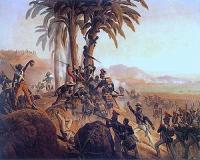Home | Military Conflict | Haitian Revolution
|
|
|
The Haitian Revolution (1791 � 1804) was a period of conflict in the French colony of Saint-Domingue, which culminated in the elimination of slavery there and the founding of the Haitian republic. Although hundreds of rebellions occurred in the New World during the centuries of slavery, only the Haitian one, which began in 1791, was successful in achieving permanent independence under a new nation. The Haitian Revolution is regarded as a defining moment in the history of Africans in the New World. Although an independent government was created in Haiti, its society continued to be deeply affected by the patterns established under French colonial rule. The French established a system of minority rule over the illiterate poor by using violence and threats. Because many planters had provided for their mixed-race children by African women by giving them education and (for men) training and entrée into the French military, the mulatto descendants became the elite in Haiti after the revolution. By the time of war, many had used their social capital to acquire wealth, and some already owned land. Some had identified more with the French colonists than the slaves, and associated within their own circles. Their domination of politics and economics after the revolution created another two-caste society, as most Haitians were rural subsistence farmers. In addition, the nascent state's future was practically "mortgaged" to French banks in the 1820s, as it was forced to make massive reparations to French slaveholders in order to receive French recognition and end the nation's political and economic isolation. These payments may have permanently affected Haiti's economy and wealth.. |




 RSS
RSS